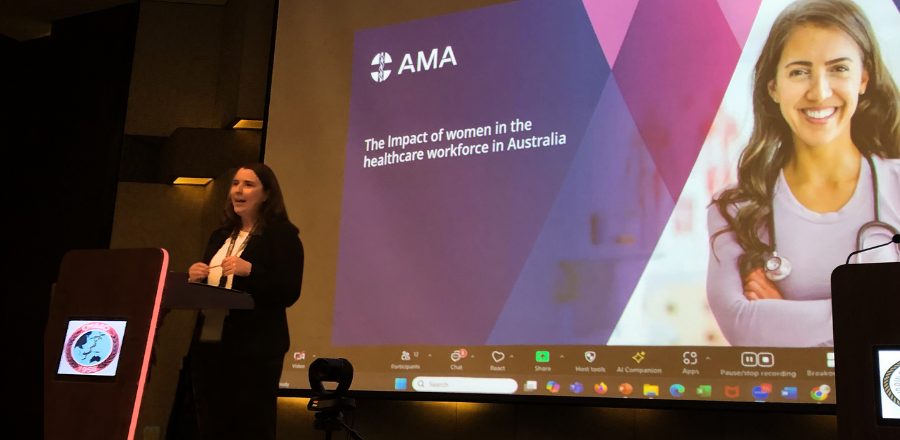President-Elect addresses 38th CMAAO General Assembly in Manila on the impact of women in the healthcare workforce
The AMA President-Elect was in the Philippines representing the AMA alongside medical associations from the Asia Pacific region.

The AMA President-Elect, Dr Danielle McMullen, recently represented the AMA at the Confederation of Medical Associations in Asia and Oceania (CMAAO) Meeting in Manila, Philippines.
The gathering of medical associations from around the Asia Pacific region was held on 24-26 August.
The 12 CMAAO member countries attending the assembly raised a broad range of concerns similar to those facing the AMA, including the expansion of scope of practice and the infringement on the role of the doctor, workforce maldistribution, doctors’ health and well-being, particularly mental health, and government encroachment on clinical independence and professional autonomy.
In relation to public health issues, members recognised the increasing risk of zoonotic diseases and antimicrobial resistance throughout the region and globally. They undertook to sign a MOU with the Federation of Asian Veterinary Associations (FAVA), to collaborate on the ‘One- Health concept, a unified approach to veterinary and human medicine in order to improve Global Health.’ This aligns with the AMA One Health Position Statement.
Speaking on the conference theme, “The Impact of Women in the Healthcare Workforce”, Dr McMullen shared the AMA’s perspective on the challenges faced by female doctors in Australia in terms of the disparity in leadership roles and the need to overcome barriers related to career disruption, perceived capability and confidence, which all have an impact on female career progression. Dr McMullen outlined the AMA’s strategies for prioritising gender equity in healthcare leadership, including the AMA’s own Equity, Inclusion and Diversity Plan 2023-25 and the AMA Advancing Women in Healthcare Leadership Partnership. For more information on this initiative, refer to Advancing Women in Healthcare Leadership.
To recognise the vital role women play in delivering healthcare services throughout the region, the CMAAO General Assembly passed the Manila Declaration on Strengthening the Role of Women in the Healthcare Workforce, below. The declaration aims to promote an inclusive and equitable workplace, support women in leadership, integrate strategies for work-life balance, build capacity and mentorship, eliminate workplace discrimination, enhance support for women in the healthcare workforce in rural and underserved areas, advocate for economic empowerment, ensure the health, wellbeing and safety of women in the healthcare workforce and encourage collaborative efforts and partnerships.
Networks across the Asia Pacific region are important for ongoing advocacy and were strengthened in Manila through bonding over policy discussions and karaoke.
The Manila Declaration on Strengthening the Role of Women in the Healthcare Workforce
Preamble
We, the Presidents, Office Bearers and delegates of our respective National Medical Associations at the Confederation of Medical Association in Asia and Oceania, gathered in Manila, Philippines, recognizing the indispensable role of women in the healthcare workforce, hereby declare our commitment to strengthening their contributions and addressing the challenges they face.
Declaration
1. Upholding Women's Contributions in Healthcare
We acknowledge and uphold the vital role women play in delivering healthcare services, advancing medical research and fostering community health. They are critical to the functioning, well-being and improvement of healthcare systems worldwide.
2. Promoting an Inclusive and Equitable Workplace
We commit to creating an inclusive and equitable workplace that respects intersecting identities, fosters a sense of belonging without fear of judgement or retribution and encourages diverse views that enable individuals to bring their true selves to the workplace and to reach their full potentials. Moreover, we commit to periodically review the recruitment policy through the lens of gender equity as well as social inclusivity and diversity.
3. Supporting Women in Leadership
We pledge to support and increase the representation of women in leadership and decision-making positions within healthcare institutions and organizations.
4. Integrating Strategies for Work-Life Balance
We recognize the need to address cultural and social norms that drive gender inequity in the workplace. We advocate for policies and practices that enable women to balance their professional and personal responsibilities to prevent burnout, including flexible work schedules, parental leave, childcare and societal support.
5. Building Capacity and Mentorship
We emphasize the importance of capacity-building and mentorship programs tailored for women to enhance their skills, confidence and career progression in the healthcare sector.
6. Eliminating Workplace Discrimination
We stand against all forms of discrimination, harassment and violence in the workplace. We call for the implementation and enforcement of policies to create a safe and inclusive environment for all women in the healthcare workforce.
7. Enhancing Support for Women in Healthcare Workforce in Rural and Underserved Areas
We recognize the critical role of women in providing healthcare services in rural and underserved areas. We commit to supporting their efforts through allocation of resources in training, infrastructure development and ensuring safety and security.
8. Advocating for Economic Empowerment
We advocate for fair wages and economic empowerment initiatives to ensure that women's contributions to healthcare are recognized and valued equitably.
9. Ensuring the Health, Well-being and Safety of Women in the Healthcare Workforce
We commit to addressing the health and well-being of women in the healthcare workforce, providing access to mental health support, wellness programs and occupational safety measures. We recognize the specific safety and security risks faced by women in the workplace and call for actions and policies to prevent harassment aggression, violence and harm to women in the healthcare workforce.
10. Encouraging Collaborative Efforts and Partnerships
We encourage collaboration between government agencies, healthcare institutions, NGOs and the private sector to develop and implement strategies that support women in the healthcare workforce.
Conclusion
We, the undersigned, affirm our dedication to strengthening the role of women in the healthcare workforce. We believe that through collective effort and commitment, we can create a more equitable, efficient, and compassionate global healthcare system for all.
Signed on this day, 26th day of August, in Manila, Philippines.